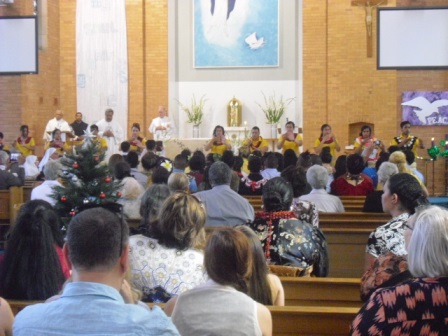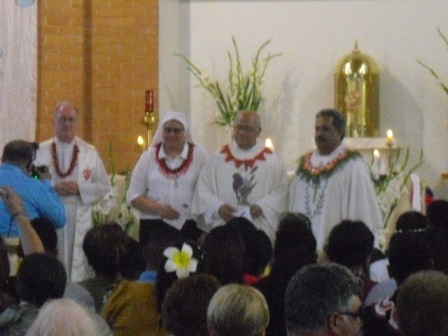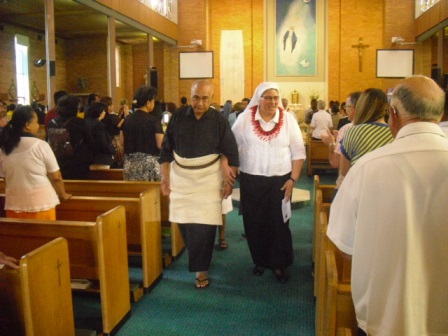Peter MALONE
BOOK LAUNCH INVITATION
For Sydney visitors to this site: Book Launch Invitation
In the Absence of Treaty
This book explores the current inadequacy of the process used in engaging with Aboriginal people, which results in control slipping away from them. It provides concise but incisive account from recent reports about the reasons for the ongoing and growing frustration of many Aboriginal people in the Northern Territory. In doing so it hints at possibly the only solution – treaties.
Published by 'concerned Australians' December 2013
Launch
Tuesday January 28 2014 6pm for 6.30pm
Gleebooks 49 Glebe Point Road Glebe Sydney
Speakers
Rosalie Kunoth-Monks OAM Elder from Utopia
Jeff McMullen AM
RSVP
This email address is being protected from spambots. You need JavaScript enabled to view it. or 02 9660 2333
CLOSURE OF DETENTION CENTRES
ACMRO welcomes closure of four immigration detention centres

The Australian Catholic Migrant and Refugee Office (ACMRO) has welcomed the decision by the Federal Government to close four immigration detention facilities in Australia.
Detention centres in far-North Queensland (Scherger), Tasmania (Pontville), Western Australia (Leonora), and South Australia (Port Augusta) are set to close in a move which immigration minister Scott Morrison describes as 'proof' that the Government's border protection policies have slowed boat arrivals.
'It is not a crime to seek asylum yet sadly these detention centres have been a source of immense pain and misery for thousands of our brothers and sisters who have come to us in search of refuge,' said Fr Maurizio Pettenà, National Director of the ACMRO.
'Australia should treat those who come to our shores with respect and dignity. Locking asylum seekers in immigration detention centres is punitive and immoral, and most asylum seekers that have arrived in Australia have been found to meet the legal definition of a refugee,' said Fr Pettenà.
'Asylum seekers have been effectively hosted in our community for many years now which is a much more humane alternative to closed immigration detention,' he said.
'The recent decline in boat arrivals is nothing to boast about if we haven't found other ways to help people who are still in desperate need of refuge. The Catholic Church encourages governments to implement policies which assist people seeking asylum,' he said.
WITH OPEN ARMS...
WITH OPEN ARMS

'I need to say something about our Australian Government and Refugees... and of how much shame I feel being an Australian overseas.
January 19 and 26, 2014 mark two very important days for all of us. The first is World Day of Migrants and Refugees and the 26th is Australia day... Which I believe is the beginning of Refugees and migrants into Australia.
Today our Prime Minister, Tony Abbott is a Catholic, and one who publicly declares himself Catholic... as well as a number of others on our Australian Parliamentary front bench... and in a different arena are often heard speaking about the right to life.
As Catholics we must affirm the fundamental human right of persons to migrate for the sake of life. In the public arena we must give voice to those unable to make their cry of distress and oppression heard.
Today, our Gospel stories keep reminding me... by tending to the wounds of refugees and showing hospitality to migrants, we put into practice Jesus' commandment: to see him in those who need us, 'for I was a stranger and you welcomed me.'[Mt25.35]
Messages are coming from many different sources - but they are loud and clear... To quote my own Bishop, the bishop of Rome, Pope Francis: 'Dear friends, let us not forget the flesh of Christ which is in the flesh of refugees: their flesh is the flesh of Christ.' [address, 24 May 2013]
My fellow Australian Catholics we are called: to nourish the faith and hope of migrants and refugees... to be open, welcoming, just and loving; 'for I was a stranger and you welcomed me.'[Mt25.35]. This is our calling!
You know as I said earlier, we often talk about life issues - this is about the protection of life! And what we are doing on the high seas is a disgrace.
This Australia Day ... with open arms then, let us welcome our sisters and brothers who leave their homeland for our country, forced by political instability, violence and persecution... and together we journey toward the Kingdom - the reign of God.'
Fr Chris McPhee msc, Australian Missionary of the Sacred Heart, based in Rome serving on the General Council.
BOAT PEOPLE
BACK TO THE BOATS
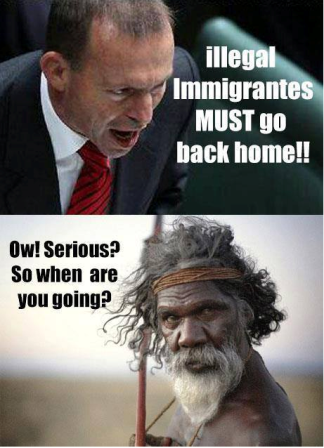
FUNDAMENTALISM

FUNDAMENTALISM: A PSYCHOLOGICAL PROBLEM
Robert J. Burrowes Countercurrents January 8, 2014
Fundamentalism is a widespread problem. It often manifests in a religious context - making it highly visible - but there are plenty of secular fundamentalists too. If we are to understand fundamentalism we should not view it as a religious problem: It is a psychological one.
What is a fundamentalist? A fundamentalist is usually considered to be a person who adheres strictly to a doctrine, viewpoint or set of principles that are considered original and 'pure'; this doctrine might be theological in nature. For the fundamentalist, many of their beliefs and the behaviours that arise from them will, at least in theory, be derivative of their fundamental doctrine. For the fundamentalist, there is no room to consider views that are at variance with their accepted doctrine and contrary views will usually either be dismissed out-of-hand or resisted with considerable vigour and, often, violence.
In contrast to the fundamentalist, a person who is 'open-minded' may still hold strong views and perhaps even have a strong conscientious position on certain issues. They will usually behave in accordance with those views and their conscience. However, despite this, they will usually also demonstrate a willingness to seriously contemplate an alternative view or course of action before discarding it. Moreover, they are likely to accept suffering, in one form or another, as the outcome of their conscientious position; they are unlikely to use violence to 'defend' it........
Read more http://www.countercurrents.org/burrowes080114.htm
QUOTATIONS FROM ELIE WEISEL
QUOTES FROM ELIE WEISEL, HOLOCAUST SURVIVOR, NOBEL PEACE PRIZE WINNER
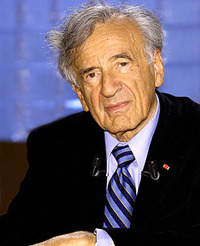
Eliezer "Elie" Wiesel; born September 30, 1928) is a Romanian-born Jewish-American professor and political activist. He is the author of 57 books, including Night, a work based on his experiences as a prisoner in the Auschwitz, Buna, and Buchenwald concentration camps.
When Wiesel was awarded the Nobel Peace Prize in 1986, the Norwegian Nobel Committee called him a "messenger to mankind," stating that through his struggle to come to terms with "his own personal experience of total humiliation and of the utter contempt for humanity shown in Hitler's death camps", as well as his "practical work in the cause of peace", Wiesel had delivered a powerful message "of peace, atonement and human dignity" to humanity.
'The opposite of love is not hate, it's indifference. The opposite of art is not ugliness, it's indifference. The opposite of faith is not heresy, it's indifference. And the opposite of life is not death, it's indifference.'
Elie Wiesel
'There may be times when we are powerless to prevent injustice, but there must never be a time when we fail to protest.'
Elie Wiesel
'When a person doesn't have gratitude, something is missing in his or her humanity. A person can almost be defined by his or her attitude toward gratitude.'
Elie Wiesel
'There is divine beauty in learning... To learn means to accept the postulate that life did not begin at my birth. Others have been here before me, and I walk in their footsteps. The books I have read were composed by generations of fathers and sons, mothers and daughters, teachers and disciples. I am the sum total of their experiences, their quests. And so are you.' Elie Wiesel
'I swore never to be silent whenever and wherever human beings endure suffering and humiliation. We must always take sides.'
Elie Wiesel
'Wherever men and women are persecuted because of their race, religion, or political views, that place must — at that moment — become the center of the universe.'
Elie Wiesel
'We must take sides. Neutrality helps the oppressor, never the victim. Silence encourages the tormentor, never the tormented. Sometimes we must interfere. When human lives are endangered, when human dignity is in jeopardy, national borders and sensitivities become irrelevant. Wherever men and women are persecuted because of their race, religion, or political views, that place must - at that moment - become the center of the universe.'
Elie Wiesel The Night Trilogy: Night/Dawn/The Accident
'No human being is illegal.'
Elie Wiesel
[From the MSC Justice Desk]
JAMES BALDWIN QUOTES
QUOTES FROM JAMES BALDWIN, AMERICAN AUTHOR

'I imagine one of the reasons people cling to their hates so stubbornly is because they sense, once hate is gone, they will be forced to deal with pain.'
James Baldwin The Fire Next Time
'Perhaps the whole root of our trouble, the human trouble, is that we will sacrifice all the beauty of our lives, will imprison ourselves in totems, taboos, crosses, blood sacrifices, steeples, mosques, races, armies, flags, nations, in order to deny the fact of death, the only fact we have. It seems to me that one ought to rejoice in the fact of death--ought to decide, indeed, to earn one's death by confronting with passion the conundrum of life.'
James Baldwin The Fire Next Time
'Please try to remember that what they believe, as well as what they do and cause you to endure does not testify to your inferiority but to their inhumanity'
James Baldwin The Fire Next Time
'Hatred, which could destroy so much, never failed to destroy the man who hated, and this was an immutable law.'
James Baldwin The Fire Next Time
'Whoever debases others is debasing himself.'
James Baldwin The Fire Next Time
'If the concept of God has any validity or any use, it can only be to make us larger, freer, and more loving. If God cannot do this, then it is time we got rid of Him.'
James Baldwin The Fire Next Time
'how can one respect, let alone adopt, the values of a people who do not, on any level whatever, live the way they say they do, or the way they say they should?'
James Baldwin The Fire Next Time
'You were born where you were born and faced the future that you faced because you were black and for no other reason. The limits of your ambition were, thus, expected to be set forever. You were born into a society which spelled out with brutal clarity, and in as many ways as possible, that you were a worthless human being. You were not expected to aspire to excellence: you were expected to make peace with mediocrity. Wherever you have turned, James, in your short time on this earth, you have been told where you could go and what you could do (and how you could do it) and where you could live and whom you could marry. I know your countrymen do not agree with me about this, and I hear them saying 'You exaggerate.' They do not know Harlem, and I do. So do you. Take no one's word for anything, including mine- but trust your experience. Know whence you came.'
James Baldwin The Fire Next Time
[From the MSC Justice Desk]
KIRIBATI PRESIDENT AND NOBEL PEACE PRIZE NOMINATION
PROMOTING THE PRESIDENT OF KIRIBATI, ATENE TONG, FOR THE NOBEL PEACE PRIZE
From the Media Release from the Edmund Rice Centre

Phil Glendenning is part of this committee formed of prominent individuals from the international community to honour the Pacific leader and to promote his climate message.
'In this part of the year when the world celebrates international human rights day, it is fitting to announce this Nobel nomination campaign - which calls us to consider the human rights of the people most at risk from climate change,' Mr Glendenning said.
'For the peoples of nations like Kiribati, climate change threatens the very existence of their culture. In promoting President Tong in this manner, the Committee's aim is to call the international community to listen to the peoples of the Pacific in their pleas for urgent and major global action on climate change,' Mr Glendenning said.
'They understand, more than most, the dangers that climate change poses to infrastructure, health and security, and to the very future of their nations.
'As the leader of Kiribati - one of the most vulnerable Pacific island nations - President Tong has long been calling for the world to take positive action to deal collectively and cooperatively with the threat and impact of climate change.'
'Since President Tong's initial election to the presidency in 2003 he has helped to carry the voice of Small Island Developing States into the global debate on climate change action. He is a key advocate on the threat of long-term climate change to the national security of low-lying atoll nations like Kiribati' said Mr Glendenning who has witnessed the changes in Kiribati in recent years.
'Among international leaders President Tong has been and continues to be one of the most compelling voices in bringing to the world's attention the fact that climate change is the ultimate challenge to human security. President Tong is a quiet man whose calm and rational voice resonates forcefully when he makes plain that climate justice is central to the quest for peace and global security in the 21st Century.
SILVER JUBILEE, SISTER ANNABEL MULLER OLSH
SILVER JUBILEE, SISTER ANNABEL MULLER OLSH
Sister Annabel Muller, Daughter of Our Lady of the Sacred Heart, celebrated her Silver Jubilee of Profession at St Paul's parish church, Bentleigh, Melbourne on December 8th, 2013. Sister is from Tonga and there was a large Tongan representation present at the ceremony, providing a strong choir as well as food for the reception afterwards.
Fr Ben Folau from Tonga (who had studied in the 1970s at St Paul's Seminary in Sydney) presided. Many sisters were present as well as MSC.
TIMOTHY RADCLIFFE OP ON ARCHBISHOP ROMERO
![]()
FR TIMOTHY RADCLIFFE OP ON ARCHBISHOP ROMERO
When I accepted to give this lecture, I had no idea how challenging I would find it. If you feel yourself at all put on the spot by this extraordinary man, you will find me there with you. I am reminded, as often before, of one of my brethren who gave a lecture in Chicago. When he sat down, the applause was not very enthusiastic. He turned to the man beside him and said: 'I hope that it was not that bad.' And the man replied: 'Oh, I don't blame you at all. I just blame whoever asked you to come and speak in the first place.'
Archbishop Oscar Romero was murdered while celebrating the Eucharist in San Salvador on March 24th 1980. He was killed because of his championing of the poor. This might make him sound like a wild revolutionary, an Episcopal Che Guevara. But in many ways, he was a traditional Roman cleric. Even his name was appropriate: Romero means 'a pilgrim to Rome'. He called Rome ' my mother, master and homeland'. His motto was Sentir con la Iglesia, to think or feel with the Church. He was quite shy, even nervous. The statue on the front of Westminster Abbey catches him well. It shows him looking at us shyly through thick glasses. How did this timid, even nervous, cleric come to be murdered? It was because he told the truth.
His sermons were broadcast on the diocesan radio station. The whole nation stopped to listen. You could walk through a village in the countryside and hear every word; everyone was huddled around the radio. The government tried to stop his preaching by blowing up the radio station. But CAFOD found the funds to get it back on the air. Moves where made to have Pope John Paul II sack, but the Pope stood by him. So in the end they had to kill him to stop him preaching.
Most of us have wanted to murder preachers because they go on so. Anthony Trollope laments: 'There is, perhaps, no greater hardship at present inflicted on mankind in civilized and free countries, than the necessity of listening to sermons.' And Romero preached often for more than two hours. But he died because he told the truth. This was intolerable to the people who ran El Salvador. A peasant once compared listening to his sermons to putting your hand into a pot of salt water: "If the hand is healthy it doesn't hurt at all. But if there is a little cut, then ouch! It hurts!"
Once when he flew back to El Salvador, an immigration official seeing him passing said loudly: 'There goes the truth.' What was the disturbing truth that he preached? How might we witness to that same truth in Britain today?
For Romero it was, in the first place, the truth of the Word of God. The Salvadorian military regime came to fear the Bible. Many campesinos buried their bibles in the ground because just having a Bible could lead to your arrest and murder. Shortly before he was also martyred, Romero's Jesuit friend Rutilio Grande said: ''I am very afraid that soon the Bible and the Gospel won't be able to cross our borders. We'll just get the bindings because all the pages are subversive.'
Why was God's Word so threatening? Often people think of the Bible as filled with obscure messages from God. You study the Bible so as to get your instructions from heaven: 'Now today I had better go and slaughter some Amalekites; I must avoid stewing a kid in its mother's milk. And it would be good to have a few stones in my pocket just in case I come across someone committing adultery.' Much of the violence in today's world is due to people apparently receiving conflicting instructions from their holy scriptures: Jewish, Christian, Muslim and Hindu. It is as if believers are tuning into different celestial radio stations.
That is not how Romero understood the truth of the Bible. It did not contain instructions from the Invisible Boss. To attend to the Word of God is to enter conversation with God that transforms us into God's friends. At least half of the Jewish and Christian Bible is not God's speaking to us, but God's friends talking to God, arguing with God, getting angry with him, asking him for things, grousing, praising him. For Romero to read the Bible was to talk with a friend: 'Háblame, Señor' he wrote in his notebook as a young seminarian: Speak to me.
Children grow up listening to the words of their parents. We do not talk to children to communicate information, but to open a space in which they may flourish and become human. The child learns that it is loved and can love. Taking part in conversation is more transformative than informative. And so it was for Romero, when he sat in the night meditating on the gospel. He was not tuning into instructions, but growing in friendship with God and his people. The Word of God was his home.
This is why Christian truth cannot be communicated by hitting people over the head with the Bible, but only in enjoyable conversation. This is how we share the life of the Triune God, the eternal love, equal conversation of the Father, Son and Holy Spirit. To be baptised is find oneself in that conversation, not knowing how it will change you. Though I am reminded of an ancient Dominican, Cardinal Michael Browne, who had been Master of the Order and Papal theologian. He returned home to Ireland and wanted to meet and thank the very ancient nun who had baptised him as a baby when he was in danger of death. At last he tracked her done. She said: 'Oh your Eminence. It was an honour to baptise you in the name of... Jesus, Mary and Joseph.'
For Romero, the fundamental moral choice was between dialogue and violence. He refused to appear in public with the government, but he would dialogue with anyone. He quoted Pope Pius XI who said that he would even dialogue with the Devil if need be. Dialogue is not about making compromises. It is not about negotiation but transformation. The deepest truths are only attainable through patient exchange, building friendship, transforming our hearts and minds. It is the very opposite of violence. So that is the first challenge that Romero puts to Christians in Britain today. Often we are tempted to scan the Scriptures for evidence that God agrees with me! There is some disputed topic: gay marriage or the ordination of women as bishops. People grab the Bible for ammunition. God must be intelligent; He is on my side. But for Romero meditation on the Word of God involves a much more disturbing experience. It demolishes my little prejudices. It subverts my narrow identity, and sets me free for friendship with God and unexpected people. Romero said: 'I always wanted to follow the gospel but I did not know where it would take me.'
Britain is usually thought of as a pretty tolerant place. We are free to talk about anything. But most of what we call 'debate', whether across the road in Parliament or on the TV or the internet is no such thing. It consist in demolishing the opposition, ridiculing one's opponents, trashing their views. Faced with the choice between conversation and violence, often enough our society chooses violence and calls it 'the exchange of opinions'. We are not much inclined to kill each other as yet. But the air is filled with violent words that accuse and denigrate others. The Duke of Edinburgh shouted at a group of tabloid journalists who were pestering the Royal Family, 'You are all scum.' To which one replied, 'Sir, we may be scum, but we are the crème de la scum!'
So that is the first challenge that Romero offers us, to listen to the Word of God which remakes us as his and each other's friends. This brought him the second truth I want to talk about, which is the terrible violence endured by God's close friends, the poorest.
On March 12th 1977, Romero's close Jesuit friend, Rutilio Grande, was ambushed as he was on his way to celebrate Mass in a village. Jon Sobrino SJ said that as Romero looked at his mutilated body, the scales fell from his eyes. He saw the violence that raged in his land. He also saw that he could not escape it and that one day it will kill him.
Romero was murdered because every week he told the truth about the violence endured by the poorest: who had been arrested, who had disappeared, who had been assassinated, the threats made. In El Salvador, the violence was omnipresent but concealed. People just disappeared, and then their bodies were found dumped by the roadside. Romero's preaching brought to word the unremitting violence suffered by the poor. He said: 'These homilies try to be this people's voice. They try to be the voice of those who have no voice. And so, without a doubt, they displease those who have too much voice. This poor voice will find echo in those who love the truth and who truly love our dear people.' (July 29 1979). That is why he was killed.
Romero confronts us with a second question: What is the violence suffered by the poor in our country? What is the truth about the poorest which remains largely unspoken? Faced with this question, I feel deeply aware of my own ignorance. A friend asked me a couple of weeks ago, 'But Timothy, have you ever been poor?' And, apart from a few weeks of hunger when I was a student in Germany, I have never been poor. But as one of my brethren said: 'Ignorance has never stopped you from speaking before Timothy.' It nearly did this time.
Though when I was a university chaplain, we used to go every week to distribute soup to the homeless in central London. Then we would hang around for half an hour to chat. Once another charity arrived with their rather inferior soup. When I was offered some, I politely declined and got a ticking off: 'Don't be proud, young man! You need help and so accept it.' This earned me a bit of street cred!
Of course there are many sorts of poverty: poverty abroad and poverty in Britain; urban poverty and rural poverty; the poverty of the destitute and of people who are not paid enough, have no job security and are burdened with Payday debt. There is economic poverty, and a terrible poverty of spirit. To talk about all of these forms of poverty I would have to lecture at least as long as Romero used to preach, and I doubt whether many of you have the patience of a Salvadorian campesino.
So forgive me for being vastly oversimplistic. The poor suffer violence in our society too. Everywhere food banks are opening because ever more people in Britain, the sixth richest country in the world, simply cannot afford to eat. Children arrive hungry at school every morning. Millions of people, especially the young, see no future, no hope. Cathy Corcoran from the Cardinal Hume Centre said to me: 'If you are a long term street homeless person in the UK your life expectancy is mid- 40s max – if you have an intravenous drug issue on top then it comes down to the mid-30s.' People disappeared from the streets of San Salvador because they were murdered by death squads. They disappear from our streets because they die. Our country is afflicted by a vast, hidden violence on the poorest. If we do not open our eyes to it and respond, then it will surely erupt and destroy our society before long.
Our blindness to this violence is not just due to ignorance. The way that we see the world filters out the dramas of their lives. The French anthropologist Pierre Bourdieu says that every society has a cognitive map which silences some people. They disappear into what he calls 'social silences.'
This is for at least two reasons. In our world everything is quantified, measured, administered. David Graeber writes that it is 'money's capacity to turn morality into a matter of impersonal arithmetic' which justifies 'things that would otherwise seem outrageous or obscene.' Of course statistics matter. I am a great fan of the admirable Office for National Statistics. It keeps politicians truthful. But if numbers shape our cognitive map, then the poor will disappear and we shall not register the violence that they endure.
According to Luke, Jesus is born during a census of the Roman Empire. Everyone must be counted so that they could be taxed. But the true Ruler of the world is recognised by the innumerable angels of heaven and disclosed to the shepherds who were too despicable and unimportant to appear on any roll. He is revealed by the uncountable to those who are not counted. God's friends and heralds do not appear on any census.
Secondly, the poor are often denigrated. In Oscar Romero's El Salvador, the language of 'national security' was used to crush anyone who opposed the interests of the oligarchy. Anyone who stood up for the poor must be a communist, and therefore deserved death.
A rightwing death squad circulated leaflets that said: 'Be a patriot; kill a priest.'
In modern Britain, the contempt for the poor often takes the form of contrasting the so-called good, hardworking poor, and the imagined multitude of skivers, parasites devouring benefits. There are such people but the vast majority of poor people in this country work but simply are not paid enough. Owen Jones has shown how members of the working classes 'are demonized by the tabloid press and by popular television shows as feckless welfare junkies, who drink too much, smoke too much, each too much, breed too much and make bad parents. They have become regular butts in the media's theatre of cruelty."'
Romero had to be assassinated because he refused to collude in the myth of the wickedness of the poor. He adapted a saying of St Irenaeus, the 2nd century bishop of Lyon: Gloria Dei vivens pauper: 'The glory of God is the living poor person.' How are we to them?
Just over a week ago, I was in Rouen for a day organised by the Archdiocese. 10,000 people came. Who says that the Church is dead in France? The first event on the programme was a Round Table on insecurity and poverty. I said: 'I want to go to that. It might help me for the lecture that I must give next week on Romero.' The reply: 'It is just as well that you want to go, since on the programme you are due to talk at it!' Three women - Valerie, Benedicte and Corinne - shared their experiences of marginalisation, from poverty to prison. They told us about how they came home to the Church. Three thousand people from the diocese listened to them with acute attention. We listened. There they were in the centre of the Church's life.
Dean Brackely, an American Jesuit¸ described what happened when rich American middle class people encountered the poor in El Salvador: 'These people shake us up because they bring home to us that things are much worse in the world than we dared to imagine. But that is only one side of the story. If we allow them to share their suffering with us, they communicate some of their hope as well. The smile that seems to have no foundation in the facts is not phony; the spirit of fiesta is not an escape but a recognition that something else is going on in the world besides injustice and destruction. The poor smile because they suspect that this is more powerful than the injustice. When they insist on sharing their tortilla with a visiting gringo, we recognise that there is something going on in the world that is more wonderful than we dare to imagine.'
The world of the poor is often violent and criminal. When I spent a summer working with the homeless in Edinburgh, the duty I dreaded most was breaking up the fights: 'I say you chaps, I awfully sorry to interfere but I would be frightfully grateful if you could just stop hitting each other for a moment.' They always did! Without wanting to become gooey eyed and sentimental about the poor, it is also a world of generosity, compassion and humanity.
Jean Vanier founded the L'Arche communities to offer people with disabilities a home and friendship. Jean said: 'When I founded l'Arche it was to "be good" and to "do good" to people with disabilities. I had no idea how these people were going to do good to me! A bishop once told me: 'You in L'Arche are responsible for a Copernican revolution: up until now we used to say that we should do good to the poor. You are saying that the poor are doing good to you!' The people we are healing are in fact healing us, even if they do not realise it. They call us to love and awaken within us what is most precious: compassion.'
This is the Copernican Revolution that we need. No more denigrating, rubbishing language about the poor. Of course there are people who cheat on benefits and milk the system: just as there are MPs, bankers and probably even clergy who do this. More radically we need witnesses to the goodness and dignity of the most marginalised, to their courage and generosity. Our flourishing is inseparable from theirs. Lila Watson, an aboriginal Australian, said to a Catholic Sister: 'If you have come to help me, you are waiting your time. But if you have come because your liberation is bound up with mine, then let us work together.'
How can we open the eyes of Britain to the great violence suffered by the poor in Britain? When Oscar Romero gazed at the mutilated body of his friend Rutilio, he took a decision which shocked El Salvador. He decided that the next Sunday there would only be one Mass celebrated in the whole diocese, in his memory. This became known as la misa unica, the only Mass. The government, the oligarchy, and even the other bishops were furious. On March 20th, 100,000 people gathered in front of the Cathedral, with 150 priests, for la misa unica.
This is the disturbing truth of the Eucharist. In Christ we are one body, and we live and die together. The earliest reference to the Eucharist is in Paul's First Letter to the Corinthians. He condemns them for celebrations of the Lord's Supper in which the rich stuff themselves with food and drink and the poor are left humiliated and hungry. This is to share Jesus' body and blood unworthily: 'For all who eat and drink without discerning the body, eat and drink judgment upon themselves.'(11.29). If the poor are shut out or humiliated, we do not discern the body of Christ.
In 1850, when the Catholic hierarchy was re-established, Cardinal Wiseman, the Archbishop of Westminster, made an ill-judged statement about how he had been appointed to govern the south of England. People were furious; questions were asked in Parliament. Then he made an extraordinary statement that sums up the nature of the Christian community: 'Close under the Abbey of Westminster there lie concealed labyrinths of lanes and courts, and alleys and slums, nests of ignorance, vice, depravity, and crime, as well as of squalor, wretchedness, and disease; whose atmosphere is typhus, whose ventilation is cholera; in which swarms a huge and almost countless population, in great measure, nominally at least, Catholic; This is the part of Westminster which alone I covet, and which I shall be glad to claim, and to visit, as a blessed pasture in which sheep of holy Church are to be tended, in which a Bishop's godly work has to be done, of consoling, converting, and preserving.'
As Christians we must, of course, campaign for justice. We must stand for election and get involved in politics. We must take stands in favour of a taxation system that favours the common good; we must oppose the growing inequality that is tearing apart our country. But we must also find ways to touch the communal imagination. We need great gestures, like the misa unica, which startle people awake. The truth of Christianity is
sacramental.
Pope Francis' very first trip out of Rome was deeply symbolic. He went to the little island of Lampedusa, and celebrated Mass in a small boat, in remembrance of all the people who continue to perish trying to get to Europe. He said: 'Who has wept for the deaths of these brothers and sisters? Who has wept for the people who were on the boat? For the young mothers carrying their babies? For these men who wanted something to support their families? We are a society that has forgotten the experience of weeping, of "suffering with": the globalization of indifference has taken from us the ability to weep!'
In 1996 I attended in Paris, the Christmas Mass for the homeless, presided over by a Spanish Dominican, Pedro Meca. He has spent years sleeping rough on the pavement with his congregation. Once a year a great tent is erected in the centre of Paris, and Pedro celebrates Mass for the homeless, on an altar made of cardboard, reminiscent of the cardboard boxes in which these, our brothers and sisters, live. A thousand came, and celebrated the birth of our brother and Saviour. What great gestures can we make that will ignite the imagination of our contemporaries?
Romero's final witness to the truth was his acceptance of his own death. Ever since he looked at the mutilated body of his friend Rutilio, he had known that this was what awaited him. When they removed his clothes after his assassination, there was a thick layer of salt. This, it is thought, was sweated out in the last moment, as he looked at the man who was about to shoot him.
'Martyr' is the Greek word for 'a witness.' A 100,000 Christians are still killed for their faith every year. There were more martyrs in the twentieth century than in all previous Christian history. It is quite a while since Christians died for their faith in this country. Is it because Britain is so tolerant or because we are so innocuous? Maybe a bit of both. We have rotas for flower arrangement and church cleaning. One can hardly imagine a rota for being shot. 'We still have a place free on the martyrdom rota for Friday. Any one free?' I preached on martyrdom in one of our great cathedrals this summer. It went down like a lead balloon. Maybe if we become insistent, dogged witnesses to the violence suffered by the poor in our country today, we too might become unpopular. Or if we were to show how our prosperity is sometimes the fruit of the suffering of people around the globe, dying prematurely because of pollution, in sweat shops, overworked and under nourished. William Cavanaugh pointed out how closely his own country, America, was involved in the death of Romero: 'The bullet that shattered in Oscar Romero's chest was made in the USA, as was the rifle that shot it. Both were paid for with our tax dollars; We also paid to train two of the three officers responsible for the assassination at the US Army School of the Americas in Fort Benning, Georgia. When I watch the movie Romero, I want desperately for Romero and the Salvadorian poor to be "us". The truth is, however, that I am "them" as much as I am "us".'
What is the truth to which the martyrs witness? Romero's life was rooted in the Word of God, a word of friendship. It invites to uncurl ourselves, to be liberated from self-obsession. It is calls us to flourish and find happiness in a love that knows no bounds. Christianity is not a harmless spirituality: Light a candle and see where you are on the Myers Briggs table. It is not a lifestyle accessory or a bit of social glue. It is the mad folly of being caught up in a love which is infinite. Or it is nothing.
Sometimes, this demands a dramatic and radical self-gift, as with the martyrs on the West Front of the Abbey. When I was an eight year old child, I imagined enemies parachuting in a demanding that we renounce our faith. Young Radcliffe would refuse and die heroically in a shower of bullets, painlessly but universally admired. But usually our witness is undramatic and unnoticed. It may be parents struggling out of a nice warm bed to feed a cantankerous infant, or caring for someone who has forgotten who you are, lost in Alzheimer's. It might be a teacher staying up late to prepare classes for the next day, or just bothering to smile at someone when you are knackered. It might be saying what you really think, when it might ruin your career and lose you your job.
Pierre Claverie was a Dominican, the bishop of Oran in Algeria. He was martyred in 1996, just after the Trappist monks in Of gods and men. He knew that they would come for him too. But shortly before he died he said that what really mattered was what he called 'white martyrdom': 'White martyrdom, that is what one tries to live each day, the gift of your life drop by drop in a loving look, being with someone, a smile, caring for someone, a work, in all these things which make that a little of our life is shared, given, handed over. One cannot hang on to one's life.' Your life is a gift to be given away. 'This is my body, given for you.' So perhaps that is Romero's last word for us. Let's not hang on to our lives. If we do, we shall shrivel. Let's not be afraid to give them away while we can. Jesus said: 'Are not two sparrows sold for a penny? Yet not one of them will fall to the ground unperceived by your Father. Even the hairs of your head are counted. So do not be afraid; you are of more value than many sparrows.' (Matthew 10. 29 – 31)
________________________________________

